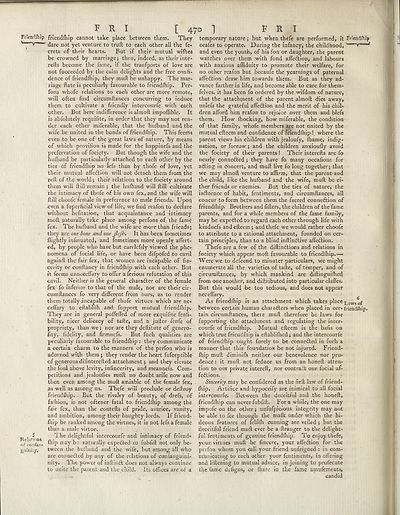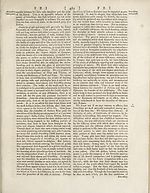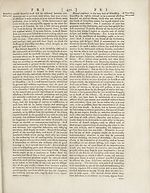Encyclopaedia Britannica > Volume 7, ETM-GOA
(512) Page 470
Download files
Complete book:
Individual page:
Thumbnail gallery: Grid view | List view

F R 1 f 4;
Fnendflnp. friendfliip cannot take place between them. They
•L'-u- dare not yet venture to truft to each other all the fe¬
rrets of their hearts. But if their mutual wifhes
be crowned by marriage; then, indeed, as their inte-
refts become the fame, if the tranfports of love are
not fucceeded by the calm delights and the free confi¬
dence of friendfiiip, they muft be unhappy. The mar¬
riage ftate is peculiarly favourable to friendlhip. Per-
fons whofe relations to each other are more remote,
will often find circumftances concurring to induce
them to cultivate a friendly intercourfe with each
other. But here indifference is almoft impofiible. It
is abfolutely requifite, in order that they may not ren¬
der each other miferable, that the hulband and the
wife be united in the bonds of friendlhip. This feems
even to be one of the great laws ©f nature, by means
of which provifion is made for the happinefs and the
prefervation of fociety. But though the wife and the
hulband be particularly attached to each other by the
ties of friendlhip no lefs than by thofe of love, yet
their mutual affe&ion will not detach them from the
reft of the world; their relations to the fociety around
them will ftill remain ; the hulband will ftill cultivate
the intimacy of thofe of his own fex, and the wife will
ftill choofe female in preference to male friends. Uporj
even a fuperficial view of life, we find reafon to declare
without hefitation, that acquaintance and intimacy
moft naturally take place among perfons of the fame
fex. The hulband and the wife are more than friends;
they are one bone and one jlejh. It has been fometimes
flightly infinuated, and fometimes more openly affert-
ed, by people who have but carelefsly viewed the phe¬
nomena of focial life, or have been difpofed to cavil
againft the fair fex, that women are incapable of fin-
cerity or conftancy in friendlhip with each other. But
it feems unnecelfary to offer a fcrious refutation of this
cavil. Neither is the general character of the female
fex fo inferior to that of the male, nor are their cir¬
cumftances fo very different from ours, as to render
them totally incapable of thofe virtues which are ne-
ceffary to eftablilh and fupport mutual friendlhip.
They are in general poffeffed of more exquifite fenfi-
bility, nicer delicacy of tsafte, and a jutter fenfe of
propriety, than we : nor are they deftitute of genero-
fity, fidelity, and firmnefs. But fuch qualities are
peculiarly favourable to friendlhip : they communicate
a certain charm to the manners of the perfon who is
adorned with them; they render the heart fufceptible
of generous dilinterelted attachment; and they elevate
the foul above levity, infincerity, and meannefs. Com¬
petitions and jealoufies muft no doubt arife now and
then even among the moft amiable of the female fex,
as well as among us. Thefe will preclude or deftroy
friendlhip. But the rivalry of beauty, of drefs, of
fafhion, is not oftener fatal to friendlhip among the
fair fex, than the contefts of pride, avarice, vanity,
and ambition, among their haughty lords. If friend-
fhip be ranked among the virtues, it is not lefs a female
than a male virtue.
The delightful intercourfe and intimacy of friend¬
lhip may be naturally expedled to fubfift not only be¬
tween the hulband and the wife, but among all who
are connected by any of the relations of confanguini-
nity. The power of inftindt does not always continue
to unite the parent and the child. Its offices are of a
]
F R I
Rclatif ns
of confan-
guiniiy.
temporary nature ; but when thefe are performed, it Fnendfhip
ceafes to operate. During the infancy, the childhood,' """v"
and even the youth, of his fon or daughter, the parent
watches over them with fond affe&ion, and labours
with anxious affiduity to promote their welfare, for
no other reafon but becaufe the yearnings of paternal
affeftion draw him towards them. But as they ad¬
vance farther in life, and become able to care for them-
felves, it has been fo ordered by the wifdom of nature,
that the attachment of the parent almoft dies away,
unlefs the grateful affedtion and the merit of his chil¬
dren afford him reafon to rejoice over them and blefs
them. How Ihocking, how miferable, the condition
of that family, whofe members are not united by the
mutual efteem and confidence of friendlhip ! where the
parent views his children with jealoufy, lhame, indig¬
nation, or forrow; and the children anxioufly avoid
the fociety of their parents! Their interefts are fo
nearly connedted; they have fo many occafions for
adting in concert, and muft live fo long together; that
we may almoft venture to affirm, that the parent and
the child, like the hulband and the wife, muft be ei¬
ther friends or enemies. But the ties of nature, the
influence of habit, fentiments, and circumftances, all
concur to form between them the facred connedtion of
friendlhip. Brothers and lifters, the children of the fame
parents, and for a while members of the fame family,
may be expedted to regard each other through life with
kindnefs and efteem; and thefe we would rather choofe
to attribute to a rational attachment, founded on cer¬
tain principles, than to a blind inftindtive affedlion.
Thefe are a few of the diftindlions and relations in
fociety which appear moft favourable to friendlhip.—
Were we to defcend to minuter particulars, we might
enumerate all the varieties of tafte, of temper, and of
circumftanccs, by which mankind are diftinguilhed
from one another, and diftributed into particular claffes.
But this would be too tedious, and does not appear
neceffary. ^
As friendlhip is an attachment which takes place Laws of
between certain human charadters when placed in cer- friendlhip.
tain circumftances, there muft therefore be laws for
fupporting the attachment and regulating the inter¬
courfe of friendlhip. Mutual efteem is the balls on
which true friendlhip is eftablilhed; and the intercourfe
of friendlhip ought furely to be connedted in fuch a
manner that this foundation be not injured. Friend¬
lhip muft diminilh neither our benevolence nor pru¬
dence : it muft not feduce us from an honeft atten¬
tion to our private intereft, nor contradt our focial af-
fedtions.
Sincerity may be confidered as the firft law of friend¬
lhip. Artifice and hypocrify are inimical to all focial
intercourfe. Between the deceitful and the honeft,
friendlhip can never fubfift. For a while, the one may
impofe on the other; unfufpicious integrity may not
be able to fee through the malic under which the hi¬
deous features of felfilh cunning are veiled; but the
deceitful friend muft ever be a ftranger to the delight¬
ful fentiments of genuine friendlhip. To enjoy thefe,
your virtues muft be fincere, your affedtion for the
perfon whom you call your friend unfeigned : in com¬
municating to each other your fentiments, in offering
and liftening to mutual advice, in joining to profecute
the lame defigns, or lhare in the fame amufements,
candid
Fnendflnp. friendfliip cannot take place between them. They
•L'-u- dare not yet venture to truft to each other all the fe¬
rrets of their hearts. But if their mutual wifhes
be crowned by marriage; then, indeed, as their inte-
refts become the fame, if the tranfports of love are
not fucceeded by the calm delights and the free confi¬
dence of friendfiiip, they muft be unhappy. The mar¬
riage ftate is peculiarly favourable to friendlhip. Per-
fons whofe relations to each other are more remote,
will often find circumftances concurring to induce
them to cultivate a friendly intercourfe with each
other. But here indifference is almoft impofiible. It
is abfolutely requifite, in order that they may not ren¬
der each other miferable, that the hulband and the
wife be united in the bonds of friendlhip. This feems
even to be one of the great laws ©f nature, by means
of which provifion is made for the happinefs and the
prefervation of fociety. But though the wife and the
hulband be particularly attached to each other by the
ties of friendlhip no lefs than by thofe of love, yet
their mutual affe&ion will not detach them from the
reft of the world; their relations to the fociety around
them will ftill remain ; the hulband will ftill cultivate
the intimacy of thofe of his own fex, and the wife will
ftill choofe female in preference to male friends. Uporj
even a fuperficial view of life, we find reafon to declare
without hefitation, that acquaintance and intimacy
moft naturally take place among perfons of the fame
fex. The hulband and the wife are more than friends;
they are one bone and one jlejh. It has been fometimes
flightly infinuated, and fometimes more openly affert-
ed, by people who have but carelefsly viewed the phe¬
nomena of focial life, or have been difpofed to cavil
againft the fair fex, that women are incapable of fin-
cerity or conftancy in friendlhip with each other. But
it feems unnecelfary to offer a fcrious refutation of this
cavil. Neither is the general character of the female
fex fo inferior to that of the male, nor are their cir¬
cumftances fo very different from ours, as to render
them totally incapable of thofe virtues which are ne-
ceffary to eftablilh and fupport mutual friendlhip.
They are in general poffeffed of more exquifite fenfi-
bility, nicer delicacy of tsafte, and a jutter fenfe of
propriety, than we : nor are they deftitute of genero-
fity, fidelity, and firmnefs. But fuch qualities are
peculiarly favourable to friendlhip : they communicate
a certain charm to the manners of the perfon who is
adorned with them; they render the heart fufceptible
of generous dilinterelted attachment; and they elevate
the foul above levity, infincerity, and meannefs. Com¬
petitions and jealoufies muft no doubt arife now and
then even among the moft amiable of the female fex,
as well as among us. Thefe will preclude or deftroy
friendlhip. But the rivalry of beauty, of drefs, of
fafhion, is not oftener fatal to friendlhip among the
fair fex, than the contefts of pride, avarice, vanity,
and ambition, among their haughty lords. If friend-
fhip be ranked among the virtues, it is not lefs a female
than a male virtue.
The delightful intercourfe and intimacy of friend¬
lhip may be naturally expedled to fubfift not only be¬
tween the hulband and the wife, but among all who
are connected by any of the relations of confanguini-
nity. The power of inftindt does not always continue
to unite the parent and the child. Its offices are of a
]
F R I
Rclatif ns
of confan-
guiniiy.
temporary nature ; but when thefe are performed, it Fnendfhip
ceafes to operate. During the infancy, the childhood,' """v"
and even the youth, of his fon or daughter, the parent
watches over them with fond affe&ion, and labours
with anxious affiduity to promote their welfare, for
no other reafon but becaufe the yearnings of paternal
affeftion draw him towards them. But as they ad¬
vance farther in life, and become able to care for them-
felves, it has been fo ordered by the wifdom of nature,
that the attachment of the parent almoft dies away,
unlefs the grateful affedtion and the merit of his chil¬
dren afford him reafon to rejoice over them and blefs
them. How Ihocking, how miferable, the condition
of that family, whofe members are not united by the
mutual efteem and confidence of friendlhip ! where the
parent views his children with jealoufy, lhame, indig¬
nation, or forrow; and the children anxioufly avoid
the fociety of their parents! Their interefts are fo
nearly connedted; they have fo many occafions for
adting in concert, and muft live fo long together; that
we may almoft venture to affirm, that the parent and
the child, like the hulband and the wife, muft be ei¬
ther friends or enemies. But the ties of nature, the
influence of habit, fentiments, and circumftances, all
concur to form between them the facred connedtion of
friendlhip. Brothers and lifters, the children of the fame
parents, and for a while members of the fame family,
may be expedted to regard each other through life with
kindnefs and efteem; and thefe we would rather choofe
to attribute to a rational attachment, founded on cer¬
tain principles, than to a blind inftindtive affedlion.
Thefe are a few of the diftindlions and relations in
fociety which appear moft favourable to friendlhip.—
Were we to defcend to minuter particulars, we might
enumerate all the varieties of tafte, of temper, and of
circumftanccs, by which mankind are diftinguilhed
from one another, and diftributed into particular claffes.
But this would be too tedious, and does not appear
neceffary. ^
As friendlhip is an attachment which takes place Laws of
between certain human charadters when placed in cer- friendlhip.
tain circumftances, there muft therefore be laws for
fupporting the attachment and regulating the inter¬
courfe of friendlhip. Mutual efteem is the balls on
which true friendlhip is eftablilhed; and the intercourfe
of friendlhip ought furely to be connedted in fuch a
manner that this foundation be not injured. Friend¬
lhip muft diminilh neither our benevolence nor pru¬
dence : it muft not feduce us from an honeft atten¬
tion to our private intereft, nor contradt our focial af-
fedtions.
Sincerity may be confidered as the firft law of friend¬
lhip. Artifice and hypocrify are inimical to all focial
intercourfe. Between the deceitful and the honeft,
friendlhip can never fubfift. For a while, the one may
impofe on the other; unfufpicious integrity may not
be able to fee through the malic under which the hi¬
deous features of felfilh cunning are veiled; but the
deceitful friend muft ever be a ftranger to the delight¬
ful fentiments of genuine friendlhip. To enjoy thefe,
your virtues muft be fincere, your affedtion for the
perfon whom you call your friend unfeigned : in com¬
municating to each other your fentiments, in offering
and liftening to mutual advice, in joining to profecute
the lame defigns, or lhare in the fame amufements,
candid
Set display mode to:
![]() Universal Viewer |
Universal Viewer | ![]() Mirador |
Large image | Transcription
Mirador |
Large image | Transcription
Images and transcriptions on this page, including medium image downloads, may be used under the Creative Commons Attribution 4.0 International Licence unless otherwise stated. ![]()
| Encyclopaedia Britannica > Encyclopaedia Britannica > Volume 7, ETM-GOA > (512) Page 470 |
|---|
| Permanent URL | https://digital.nls.uk/189127885 |
|---|
| Attribution and copyright: |
|
|---|
| Description | Ten editions of 'Encyclopaedia Britannica', issued from 1768-1903, in 231 volumes. Originally issued in 100 weekly parts (3 volumes) between 1768 and 1771 by publishers: Colin Macfarquhar and Andrew Bell (Edinburgh); editor: William Smellie: engraver: Andrew Bell. Expanded editions in the 19th century featured more volumes and contributions from leading experts in their fields. Managed and published in Edinburgh up to the 9th edition (25 volumes, from 1875-1889); the 10th edition (1902-1903) re-issued the 9th edition, with 11 supplementary volumes. |
|---|---|
| Additional NLS resources: |
|

